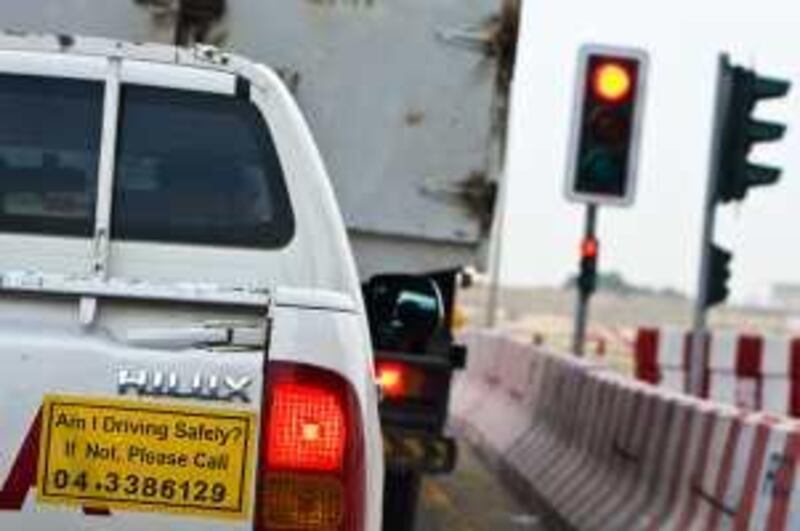DUBAI // "Am I Driving Safely? If Not, Please Call [this company's number]". It is plastered on the back of almost every minibus barrelling down Sheikh Zayed Road, and every lorry hauling its load across the country.
If commercial vehicles flout the rules of the road, the stickers - usually bright orange - offer motorists recourse, a means to complain to companies about reckless chauffeurs or drivers who park illegally. That is the theory. But after a personal run-in with an errant driver, even Dubai's top traffic policeman has questioned the value of the ubiquitous warning stickers. The National recently called 10 of these numbers, chosen at random, to test their effectiveness - not to report offences, but simply to test how they handled a purely theoretical complaint about their drivers.
The responses included "Do you want to buy curtains? Which curtains, sir?", and "Menu?" One small university in Ras al Khaimah said it directed all complaints about its minivans to the school's dean. One call went unanswered, despite multiple attempts. In one case, calls about a white Toyota Hiace lorry, owned by a Chinese restaurant in Dubai, were handled by employees who seemed particularly confused about the purpose of our call. Asked about the restaurant's policy regarding its delivery drivers, the responses ranged from "Menu?" to "No, no driver here".
Calls about a red minivan operated by Aramex, the courier company, were met by an automated answering service offering three menu options, none of which involved lodging complaints. After connecting with the operator, the caller was then placed on hold for two minutes, connected to an "operational team leader", and then, following another brief period on hold, to a "fleet operations supervisor". "Until now I don't think we have received a reckless [driving] complaint," said Bashir Ahmed, Aramex's operational team leader, who helps oversee the company's fleet of 250 vehicles. "But when the courier is going for a delivery, and he's parked behind someone's car, it might be for two or three minutes. [In such a situation] we apologise to the person who complained and we take action. And we take action and warn them. Definitely it doesn't happen continuously."
He added that "we don't fire" drivers. Dubai authorities last year called for a ban on minivans for transporting passengers after a spate of fatal accidents involving them. Traffic police referred to them as "ticking time bombs", because of their unusually high accident rates. Still, there are no laws in Dubai requiring commercial vehicles to carry warning labels with easily identifiable contact numbers.
Maj Gen Mohammad Zaif al Zafein, the director of the traffic department at Dubai Police, said it was important for people to call the numbers if they felt someone was driving dangerously, even though it might sometimes prove futile. "Whenever you call, there is no response, nobody answers. I tried it myself once, and it took so long, and nobody answered," he said. "Try it yourself. Maybe it differs from one company to another. Maybe. Once I tried it and I didn't get an answer; the phone kept ringing and ringing.
"I want to encourage the public to call this number. I think it would act to promote safety on our roads." Not every call that The National placed was futile. Tarwada Cargo Transport, a shipping company in Dubai, explained how it used sophisticated GPS tracking devices to monitor its fleet of about five cars and 50 large lorries. "If we find the driver has created a problem, we try to sort it out within the company, but if not, then we inform the authorities," said Jitander Singh, the company's operations manager.
"It [the system] saves money on fines, which will benefit us, and it also avoids accidents." Jocelyn Viernes, an employee at Globaleye, an insurance broker, said the company's lorry had only ever received one complaint. "He called and said, 'Your driver just won't go to the other lane. I'm flashing him.' So we took his details," she said. "When the driver came back in, we asked him about it. He was actually driving in the centre lane. The guy was flashing him unnecessarily, when in reality he was quite free to overtake our driver on either side. We weren't quite sure what the problem was."
hnaylor@thenational.ae






